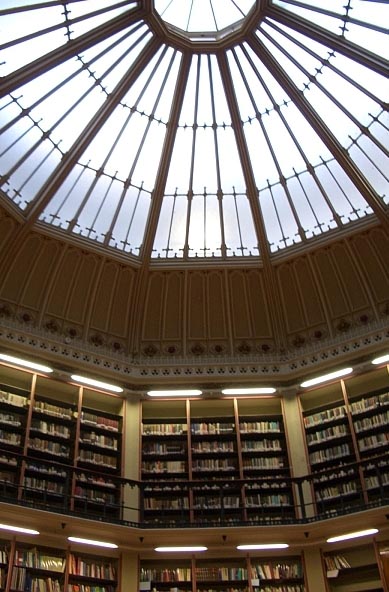 |
| Maughan Library Clock Tower |
We were given a short history of the building, university, and collections by Sally Brock, the library manager. The library building in which the Maughan is housed was formerly a public records office, so the entire building is fireproofed. The library moved into the building in 2001, and this allowed them to bring together what used to be four separate collections into one multidisciplinary library. The collections cover arts, humanities, social and physical sciences as well as other subjects. The library decided to have open shelves so that everything is accessible to students and so they're able to browse the collection. There are over 1000 places to sit and study and 300 computing stations for students; there is also wireless access throughout the building. The library is open seven days per week, and is open 24/7 during the finals period of each semester, so they are usually open all day for 10-12 weeks per year. Ms. Brock also discussed the goals of the library in providing a good "student experience", which many universities are trying to emphasize--the library is attempting to provide group study space, improve social seating, start using self-service for charging and discharging items, and librarians are trying to roam the stacks more often to have a more proactive approach to customer service, and hopefully improve the service that students are getting.
We also visited the Foyle Special Collections Library at the Maughan. They showed us some of their more significant and rare collections, which were fairly interesting. A large part of the special collections is the collection of the Foreign Commonwealth Office, which was acquired by the library in 2007, and which includes more than 60,000 items including books, periodicals, manuscripts, and photographs. One of the earliest items that the library owns is the Nuremberg Chronicle from 1493, which is a history of the world. The special collections also has a lot of medical materials, including some of Florence Nightingale's things from the Crimean War. They also showed us a D Day album, and album of the coronation of the current queen, a signed copy of the Charters of the State of Pennsylvania with Benjamin Franklin's signature, and a copy of Allen Ginsburg's poems which are signed by the author. There were also some interesting drawings of a concentration camp that an inmate was forced to draw by those keeping him in the camp; he was essentially drawing propaganda--the librarians discussed how it was difficult to determine whether they had the rights to digitize these drawings and the trouble with promoting contentious materials.
 |
| The Round Room: http://www.victorianweb.org/art/architecture/london/121g.jpg |
I thought this was a great example of an academic library that is trying to provide students with the types of servicesthey need, and the librarians understood that the way library space is set up is crucial in determining the way in which students use the library. If all the tables in the library are only for individual study, then doing schoolwork would be difficult as a lot of coursework is now done in groups. Also, the computer labs were set up like classrooms as many academic librarians also teach training sessions for library users, which was also well thought out when it was designed. I also thought the library was very technologically advanced in the tools they had at their disposal for circulation--they had RFID self-service checkouts and returns. They had a wand that would read the RFID tags in books and let the librarians know which ones were on hold for customers. The building itself was huge, with many good places to study--I think the students at the Kings College Strand campus are lucky to have such great collections and spaces in their library.
No comments:
Post a Comment